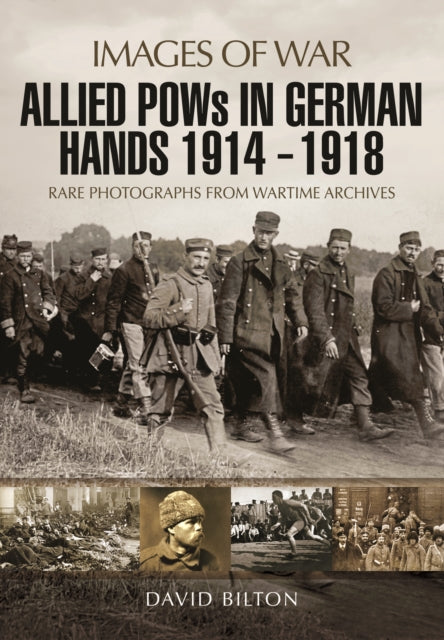Images of War: Allied POWs in German Hands 1914 - 1918
Usually shipped within 24 hours
UK deliveries from £5.95
Delivery & Returns
Delivery & Returns
We use the Royal Mail, DHL Express or UPS for our customers. For UK addresses, deliveries under 10kg are a standard £4.95 via Royal Mail Tracked 48 Service. For orders over 10kg and overseas customers, postage is calculated for you at checkout once you have entered your postal address. This price, does not include any potential custom charges that may apply, depending on the product or destination, as every country has very different import duties / taxes. Online exclusive products (such as trainers) will be delivered to you directly from the printer, separate from other items in your order, but your postage fee covers ALL items in your order.
If you are unhappy with your purchase, please email shop@tankmuseum.org within fourteen (14) working days of receiving your goods, and return it to us at the address below, in its original condition, unopened (with any seals and shrink-wrap intact) and we will issue you a full refund or replace it. Goods must be returned at your own cost. If the item is faulty, you do not need to return it, we will send you a replacement free of charge.
Description
Description
By David Bilton
In this first fully illustrated history of the Kaiser's unwanted guests, the author looks at the lives of the thousands of Allied men who became PoWs during the Great War. After making the decision to surrender, the soldier, sailor or airman was at the mercy of his captors. The book examines what it felt like to surrender, the dangers involved and then the often long journey to a camp in Germany.
For some the there was no journey, they were kept at the Front to help the German war effort. Not all camps were the same; some were better than others, a situation that could easily change with the replacement of the commandant, but most were poor. Disease was rife and there was little medical care.
Barracks were usually cold and there were few blankets and little clothing. Men were abused, starved, denied their basic rights, sent to work in appalling conditions and some were murdered. There were thousands of civilians interned as well, who mostly fared better than combatants, however they did not have it easy.With the arrival of parcels from home most prisoners could implement their diet, but this was not the case for Russians who received little help and relied on handouts from other prisoners.
Escape was a priority for many men; thousands tried, even though they could be shot for the attempt, as some were, but most failed to make it home. Then the Armistice was signed and the PoWs were freed. Some managed to walk to Allied lines, most had to wait for transport.
Within a few months they were all home, except for the thousands of prisoners that were missing, that the Germans claimed they never had.
![Images of War: Allied POWs in German Hands 1914 - 1918 Book [variant_option4]](http://tankmuseumshop.org/cdn/shop/products/9781473867017.jpg?v=1748336286&width=1214)

![Images of War: Allied POWs in German Hands 1914 - 1918 Book [variant_option4]](http://tankmuseumshop.org/cdn/shop/products/9781473867017.jpg?v=1748336286&width=88)
![Tank Museum Playing Cards Game [variant_option4]](http://tankmuseumshop.org/cdn/shop/files/ProductShoot_10_10_2025035.jpg?v=1760358498&width=176)
![Tank Museum Wrapping Paper - Two sheet pack Wrapping Paper [variant_option4]](http://tankmuseumshop.org/cdn/shop/products/Wrapp_Paper_All.jpg?v=1748337915&width=176)
![Images of War: Allied POWs in German Hands 1914 - 1918 Book [variant_option4]](http://tankmuseumshop.org/cdn/shop/products/9781473867017.jpg?v=1748336286&width=640)



